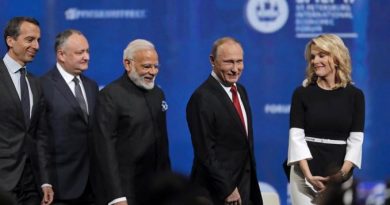Cut Russia Some Slack; China, North Korea Hacked Worse
By Vincent Maresca
Staff Writer
Americans who voted for Trump and the Republican platform will most likely appreciate the people and institutions of Russia for exercising universal liberties.
Although contemporary Russia struggles to rise from nearly a century of destructive communism and the 1990’s unbridled capitalistic democracy, the Medvedev and Putin administration has strengthened the role of the state, revived the economy (at least before the sanctions), defeated failed politicians and oligarchs while establishing closer ties with Russia’s major religions: Orthodox, Judaism and Islam.
Such values are admirable and certainly could find support in an America where the Constitution enshrines rule of law and freedom of religion. Although far from perfect, Russia today has multi-party elections, a diverse press with both state-owned and privately owned outlets, and strives to maintain an open diplomatic dialogue with the U.S. despite sanctions.
First, the issue of “interference” is based on the false premise that the alleged hacking determined the elections. President Obama’s new sanctions for the alleged Russian hack in the 2016 elections are absurd if we carefully analyze what it means to have free elections; it requires a free press, free speech, and free expression among the electorate.
According to a November 2016 Diplomatic Envoy article, staff writer Aidan Dion argues that hackers serve a purpose by exposing a level of political corruption within a system. Americans have a right to know the leaked e-mails, which revealed the embarrassing political trickery engaged by some in the Democratic Party.
Before WikiLeaks released the emails, Vox reported on the rigged Democrat primary elections against Bernie Sanders. When WikiLeaks released John Podesta’s emails containing content demeaning conservative Catholics and Christians, the Washington Post confirmed the news in an October article; finally, Donna Brazile passed questions to Hillary before a debate according to Salon magazine and no one in the mainstream media questioned why Hillary Clinton did not refuse to engage in such unethical behavior.
Second, it is exaggerated that Russians interfered in the U.S. elections. During an election, “interfering” is the name of the game as competitors seek to win votes. Americans were subjected to the one-sided reporting of the mainstream media which heavily favored Hillary Clinton.
The United Kingdom’s BBC News biasedly covered Donald Trump, and they leaned favorably toward Clinton. The same can be said of France 24’s coverage or the German newspapers’ coverage of the U.S. presidential election, as well as the German news broadcaster Deutsche Welle.
These newspapers and television channels, which distribute and broadcast their news in the United States as well as their home countries, may have swayed American citizens to vote against Trump with their biased coverage. Is this not foreign interference? Are we to place sanctions against these European countries for interfering in the U.S. presidential elections with their biased coverage, at times slanderous against Trump?
Obama’s sanctions against Russia for the alleged interference may seem childish if not blatantly aggressive, as well as intolerant of universal human rights, which include freedom of the press, freedom of expression and freedom of speech.
Finally, when one looks at the Obama administration’s retaliatory measures against the alleged meddling of Russia in the U.S. election, there is no proportion when comparing it to the state-sponsored cyber hacking done by China and North Korea. According to the Wall Street Journal, China hacked into the U.S. government’s Office of Personnel Management (OPM) and acquired sensitive information on all government employees on June 5, 2015.
That was far more serious than the alleged email hacking of the unprotected and vulnerable computer systems of the DNC by Russia, because the foreign government of China stole sensitive material of U.S. government personnel.
Unlike Russia, China does not have democratic elections; it still maintains a one-party communist system and the cult of personality for Mao Tse-tung, perhaps the bloodiest tyrant of the 20th century. Why did the Obama administration react against Russia with a second set of sanctions while there were no sanctions against China for the hacking of the OPM? Putin has refrained from reacting on a tit-for-tat, and this has salvaged diplomatic relations with the U.S. during this brief transitional period from Obama to Trump.
With President Trump’s election, the world community may very well see a more engaged America ready to promote freedom and prosperity, open to the world community and ready to make friends with whoever desires to do so.

